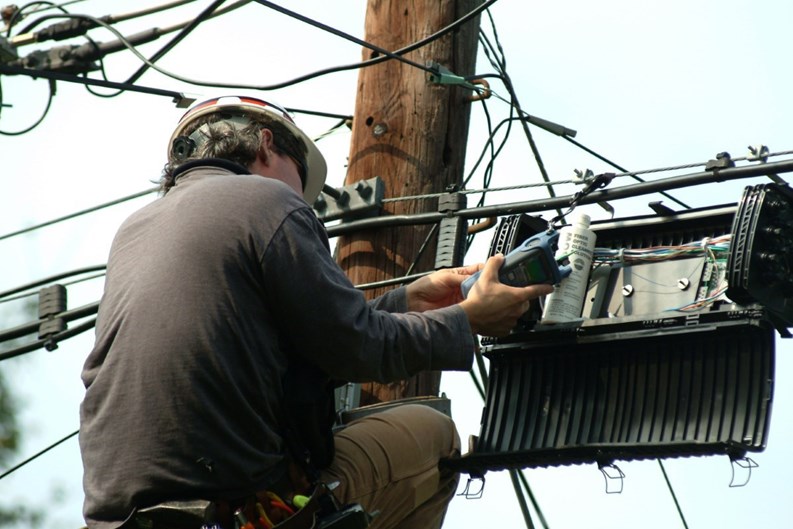Two months ago, Sam Levy felt like he was spending more time on the phone with Time Warner than with his girlfriend Nikki. Levy, who lives in western Brooklyn, a region served exclusively by Time Warner, was having trouble with his cable service and Internet connection, and, working full time, he could not wait around his apartment for the cable repairman between the hours of noon and 5 p.m.
Clearly, Levy’s situation is nothing short of unique. Neither was his frustration that, if he wanted to have cable and Internet service, he didn’t really have much of a choice but to grin and bear it.
“With only one cable provider in our neighborhood, we [customers] have no leverage to demand better service. It seemed like their customer service model was to infuriate people into apathy,” said Levy, who begrudgingly admitted that for awhile he chose the agitation of poor service over the agitation of making repeated calls to his cable provider.
“On the positive,” he added, “I did go outside more.”
But for Levy and cable customers like him, there is new hope.
FCC Ruling
In October, the U.S. Federal Communications Commission (FCC) ruled against the legality of exclusive cable contracts in multi-unit dwellings, including condominiums. According to FCC Chairman Kevin J. Martin, cable prices have risen 93 percent in the last decade, and the goal of the new ruling, for one, is to lower prices.
According to Vincent Grippo, chief of staff of the Department of Information Technology and Telecommunications (DoITT,) the FCC ruling in New York is a bit of a moot point.
“New York state already had a provision in place…that made it illegal…for any building, residential building owner, landlord, [or association] to prohibit a company from being able to come into their building and wire [it] for cable service. So, that FCC order…was actually to target other municipalities and states that did not have laws on the books.”
What It Means For New York City
In the five boroughs, where exclusive contracts were already illegal, the FCC ruling does not mean a lot in terms of new legislation, but it is “nice to have, because as a municipality we are trying to encourage competition,” says Grippo. “Right now we have Verizon entering the New York City market, [and] we want to make sure that they are given every opportunity to get into every building across the city.”
Verizon plans to have the entire city, all five boroughs, wired with its FiOS fiber optic network by 2014, which will ultimately give all New Yorkers at least two options when it comes to a cable service provider, and “true competition” within the industry.
For a long time in New York, “20 or 30 years, there has been a monopoly for cable television,” says Grippo. “Time Warner and Cablevision made a business decision back in the ‘80s. They decided they did not want to compete with each other. They felt at that time, that the cable market really couldn’t support more than one company.” So, the two companies portioned out the city, with each having its interest in covering certain areas. They bought out existing franchises and essentially became the sole cable providers in their respective areas. (Granted, there is the option of a satellite provider, but Grippo points out that due to the ‘canyon’ effect of the city’s buildings of varying height, satellite doesn’t “necessarily work here.”)
“That was really a business decision. By law and interest, the city of New York cannot force a monopoly. If Time Warner and Cablevision wanted to compete, and wanted to have franchises citywide, they would have been granted franchises citywide,” explains Grippo.
Recently, in April, however, a solicitation was sent out from the city for new entrance into the cable market. In May, a deal between Verizon and the city was announced that includes the commitment of Verizon to “build out to all homes in New York City by 2014,” according to Grippo. That agreement has been forwarded to the city’s Franchise and Concession Review Committee for approval, and if approved, will then go on to the New York State Public Service Commission.
Once Verizon’s franchise is approved, they will begin to offer television and video service. According to Grippo, they have already wired 20 percent-30 percent of the city and currently, they are offering voice and data service to some parts of the city, without television. They have been able to build out their network without a franchise, having been grandfathered in as a phone company.
The Product
According to John Bonomo, a Manhattan-based spokesperson for Verizon, “We think we have a better product and a better network, and for a comparable price, we think we provide an overall better service.” To Bonomo, FiOS fiber optic technology is the future of cable, because unlike standard coaxial cable wire, it is “future-proof.”
“The technology today versus what we had in 2003 is astounding. Look five years out from now…we feel that the technology, the capacity of fiber optics, will be able to handle” the rapidly evolving technological capabilities of the future, “and we don’t think that the technology of the [existing] cable networks will be able to handle that.”
Bonomo also mentions that Time Warner and Cablevision may “claim” that they have fiber optics, “but if you look at the end to end service from origination point directly to the customers’ door, it’s not 100 percent for either one of those companies. They’ll have a segment of fiber optics in their network,” but they do not bring fiber optics directly into the home. “We have 100 percent fiber coming directly to your home, which means that your Internet connection is faster and provides you with greater bandwidth. It means that your TV signal is clearer, crisper, and provides a better picture.”
According to Patrick MacElroy, a spokesman for Cablevision Systems, “Our network is fiber rich, as well. We run fiber to what’s called a node, and then we use coaxial cable to deliver service into the house or into the apartment.” MacElroy also points out that “in the select areas where FiOS is available, they utilize fiber to the side of the house and coaxial cable into the home, the same hybrid fiber-coax[ial] blend used by Cablevision.”
According to Grippo, Verizon will run fiber into a master control box in the home, and then run coaxial cable from the control box to the various cable boxes within the home. This extension of the fiber optic cable into the home supposedly “will give higher capacity…In the long run, on that system. [It] will have the ability to potentially offer higher download speeds, combined with potentially more HD content—the things that really eat up bandwidth.”
“I used to be a Cablevision customer,” says Bonomo. “I used to pay, just for my cable TV service and this goes back around three years ago, about $80 a month…Now, virtually any cable TV company [in the country] is offering three services—TV, Internet, and voice” for around $90–$99 dollars a month. “The bottom line is people are getting all three services for somewhere in the neighborhood of $95-$99 dollars a month.” Bonomo credits competition in the marketplace for a reduced price of this “triple play” service, and hypothesizes that without competition, and in particularly the entrance of Verizon into the marketplace (outside of New York City) the price for all three services would be much, much higher.
Obviously, Verizon has a long way to go before its infrastructure is set up and the whole city is wired. Considering the speed at which technology has evolved in recent years, it’s difficult to say what 2014 holds for cable technology in the city. But with the FCC ruling, the city’s solicitation for a citywide cable provider, and Verizon’s bid for a five-borough franchise; it is certainly exciting to see how new competition in a long-monopolized industry will pan out, especially for customers.
According to the MultiChannel News website, a report by Sanford Bernstein cable and satellite analyst, Craig Moffett, noted that contrary to predictions, cable providers are not lowering their prices to compete with telecommunications companies like Verizon, but rather, raising them. In November 2007, Verizon announced that prices for the FiOS bundle service of voice, video and data service would rise 11.6 percent in 2008. In turn, Time Warner and Cablevision Systems were also raising their rates in 2008.
“There’s no guarantee that prices will go down. There’s no guarantee that companies will change their practices and be more willing to negotiate deals,” says Grippo. “It’s just typically that’s what you would see, and you hope that competition will do that in New York City.”
In the mean time, customers will have to wait and see how the new telecommunications competition will affect cable pricing.
Brendan J. Flaherty is an associate editor withThe Cooperator.







8 Comments
Leave a Comment